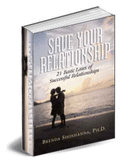 Infidelity and the threat of it, is the largest single issue that threatens relationships. If the partner has actually been unfaithful, or even if there is a suggestion of interest in another, the marriage automatically goes into a crisis mode.
Infidelity and the threat of it, is the largest single issue that threatens relationships. If the partner has actually been unfaithful, or even if there is a suggestion of interest in another, the marriage automatically goes into a crisis mode.The basis of all good relationships is the ability to trust. It is not only the sexual betrayal but the fact of having been lied to that is so devastating. This break of trust takes time, patience and wisdom to repair. Rather than lapse into hurt and blame, it is absolutely necessary to understand and discuss what caused this breach to happen.
Understanding Infidelity
Often infidelity arises because certain needs in a marriage have not been met. Other times it arises as an act of resentment against the partner, or as a desire for freedom and adventure. Sometimes there are issues in the individual or in the relationship which have not been dealt with and which have simply festered. Rather than deal with them directly, the person then escapes the entire situation by getting involved with someone else.
Whether or not you stay in the relationship, it is necessary to uncover the true causes. Many women blame themselves for it and are often left feeling unattractive and unlovable. This negative reaction must be handled. When the woman understands the true causes of what happened, she will not be left with tattered self esteem. (The same is true for men).
The question often comes whether or not it is possible to repair the broken trust and go forward in the marriage after infidelity. If both individuals are willing to confront the issues, be open to honest communication, be respectful of one another, then the marriage can emerge even stronger than before.
Nevertheless, all must realize that this takes time, patience and commitment. The feelings of betrayal and suspiciousness may continue to go on for awhile. When they appear, it is necessary to address them and receive the reassurance needed once again. It is also necessary to create firm boundaries in the relationship that are adhered to and respected by both individuals.
Is it Cheating?
The question of what is infidelity has become much broader now, as individuals have such great access to others through the internet, where it is easy to satisfy wishes for companionship, fantasy or adventure. It is important to realize, however, that when we do not see or have to interact with another in person, when no demands are made of us, it is easy for fantasy relationships to develop. Due to the anonymity available individuals often feel that they can easily exchange intimacies that are not so easy to exchange in person. This stimulates a hotbed of fantasy and it is easy to feel one has someone in their life who cares and is there for them.
Online Relationships
Online relationships have become a common and easy way to find adventure and diffuse stress. Many wonder whether intimacies exchanged with strangers online constitutes an infidelity of some kind. This is a delicate question which must be answered individually by the couples themselves. Many feel disturbed and threatened by their partner sharing intimacies with strangers online.
Sharing intimacies with another in this manner has been called emotional infidelity, not having sex with another, but thinking of them, being with them in fantasy and withdrawing emotions from the marriage partner herself. There is a thin line here and it is crossed easily, so online relationships for those who are married need to be discussed, defined and boundaries set for them.
Again, one must question why this on-line relationship is gong on at all? How much intimacy is available in the marriage? One has to explore why this is happening at all.
Easy Access To Temptation
Unfortunately, due to its easy accessibility, many married men are found engaging in online porn. When their wives find out they feel utterly betrayed, threatened, unattractive, humiliated and insecure.
Sometimes they discover the online porn because their husband’s sexual desire for them has decreased and their lovemaking is much less frequent. Online porn can become and often is an addiction. It can be much harder to break than one first realizes. This kind of addiction does not necessarily arise because the husband feels that his wife is undesirable, but because it is so much easier to relate in a fantasy mode than with a real flesh and blood person. In fantasy, one does not have to meet the needs of the other, or prove themselves in anyway.
These fantasy situations can also provide all kinds of highs and excitement that a real flesh and blood relationship is not able to offer anymore. This can become a serious problem which requires professional help. In these cases, it is necessary to let your partner know that this behavior is unacceptable, unhealthy, bad for your sense of self esteem.
Set Firm Boundaries
Boundaries have to be firmly set here. Many men minimize their involvement with online porn, and do not realize the consequences this activity is having and what a threat it is to their relationship. Even though the man minimizes it, the woman must hold onto her own reality and need for respect. She must see to it that professional help is sought if he cannot stop by himself. The longer an addiction grows the harder it can be to let go of.
It is important to recognize these threats to your relationship for what they are, not blame yourself for them or brush them under the table, but to face them directly in a constructive and hopeful way. Blaming the self or blaming the other is never helpful and leads nowhere. Acceptance, communication and understanding, however, go a long way. Needless to say, both must be willing to work on this together.
If one partner is not willing to deal with it, then the other should seek help in making constructive choices for themselves. All relationships go through challenges. Whether they destroy your relationship or make it stronger, is up to both of you. It takes two to make this commitment, however. One person cannot do it alone.
Discover the surprising truths about love and how they can save your relationship in Dr. Shoshanna's e-book and program Save Your Relationship (21 Basic Laws of Successful Relationships), www.truthaboutlove.com. This program has helped thousands and it can help you too.
Copyright 2006 Brenda Shoshanna


































